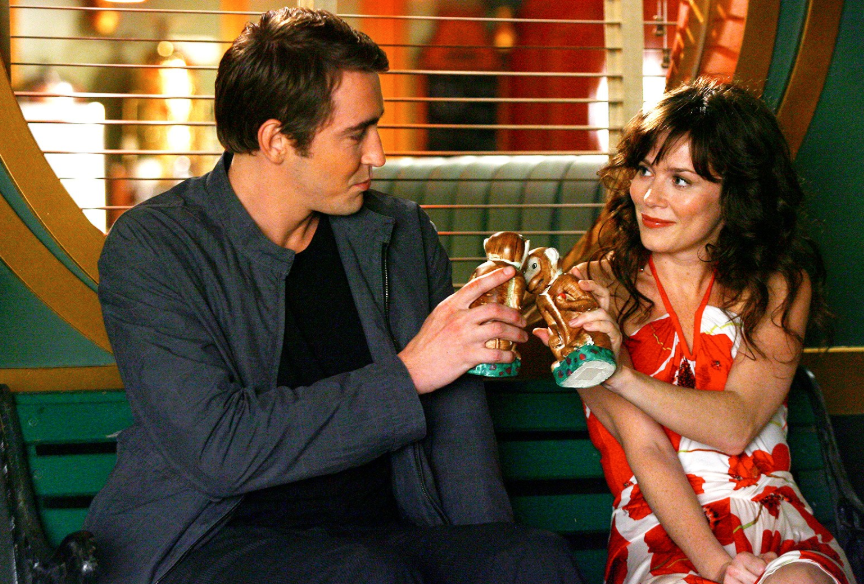|
by Katherine Schloss Lately I’ve been too caught up in it all to sit down and truly commit myself to binge watching a new show. Summer nights spent cramming One Tree Hill until my eyes watered are a far-off memory. Then, my roommate suggested Pushing Daisies, and I absentmindedly starting watching the pilot episode as I packed for spring break. Straight off the bat I was incredibly intrigued by how intentional the cinematography felt. It was very Wes Anderson-esque, with odd color palettes and quirky, witty one liners that are given care and attention. A few episodes in, I discovered that the show was tragically discontinued after two seasons. This dilemma has plagued me often in the niche, cult classics that I tend to be drawn to (another example being Freaks and Geeks). I often wonder how it is that other shows can gleefully exist with their cliff hangers, mistaken identities, etc. while my shows must forever be frozen in time, subject to the powers that exist outside of their realm of existence, a reminder that while trying to maintain my image of the characters as very real, there is also the very real fact that they are mere creations. Is it better that the end is left up to the imagination? Does this extend their existence as never-ending and incapable of being sugar coated and boxed into a set path? Should you even start a show knowing full well that there won’t be any satisfaction of a resolution at the end?
Shows like this are often overlooked by mainstream efforts to drag crime shows on with 10 plus seasons, playing out every possible scenario and stretching the characters and their stories thin. I don’t want to belittle shows that rely on the malleability of their characters in such a way, but there is something to be said about a storyline where characters are created with a certain depth and groundedness that makes you identify so heavily with them.That’s exactly why I find shows such as Pushing Daisies and Psych so refreshing. Both center around male protagonists who have tumultuous relationships with their fathers and are subject to playful yet often traumatic childhood flashbacks. However, they differ in a few pertinent ways: one leading man has a special, mystical gift and one merely pretends to. Psych therefore manages to cross a fine line as Shawn (the main character), a restless soul who cannot hold down a job for more than a few weeks at a time, finds his calling by pretending to be a psychic for the Santa Barbara police force, secretly relying on his keen detective abilities that he learned through years of unwanted daily training through his father. There is an awareness and lightheartedness that comes with the knowledge that he cannot sustain the act until the end of time, making the show, with its endless references to obscure 80s-isms, entirely endearing and digestible. It is decidedly real in its location and presentation of realistic situations, and yet there is a sort of blatant and cheeky undertone of the ridiculousness of the legal system and detectives in general. In comparison, Pushing Daisies is presented through the steady voice of Jim Dale-- notable for his narration of the Harry Potter audiobooks-- relying on the fantastic element of its main character (Ned) possessing the ability to bring dead people back to life. This gift comes with two catches: firstly, if kept alive for more than a minute, someone else randomly dies; secondly, Ned cannot touch the person again without them returning to their dead state. Once he brings his childhood love back to life, there exists the heart-aching situation in which they cannot touch. This creates, within the modern fairytale of sorts, a unique ability to explore a male character’s affection for a woman minus the usually heavily-present physicality that generally comes with TV’s depictions of lust and love. His inability to touch her is, indeed, very touching. In Psych, this plays out as a fragile man’s chase of the head detective’s affections, turning the common power dynamic on its head in a cat and mouse chase that involves a strong woman’s dedication to her career. Both shows are decidedly unique despite their existence within the detective genre, each with a nuanced ability to deliver comedy and commentary with heart and flair despite their decidedly niche existences. It can be argued that these shows warp our understanding of crime and the criminal justice system. Instead of developing “mean world syndrome,” which causes viewers to perceive the world as more dangerous than reality, these particular television programs make the viewer feel as though they should go into the business of solving murders. I certainly considered criminal justice after obsessing over Sherlock in its delicious Britishness and addictive portrayal of the analytical process that accompanies solving a murder or crime. In a similar vein, the Pushing Daisies creator Bryan Fuller hoped to create an appreciation for life despite the show’s inherent focus on the topic of death. His Amelie-inspired amalgamation of patterns, vibrant color schemes, and quirky dialogue may have been cut short, but the show’s defiant spirit lives on.
1 Comment
Caroline
4/2/2019 10:51:13 pm
Wow
Reply
Leave a Reply. |
Archives
March 2024
Writers
All
|

